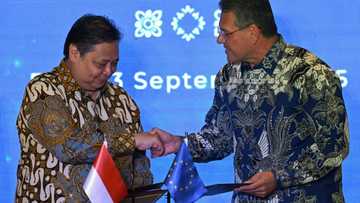US sanctions on Serbian oil firm will start October 1: Vucic

Source: AFP
US sanctions on Serbia's largest oil producer, which is majority Russian-owned, will finally come into force on October 1, Serbian President Aleksandar Vucic said Thursday.
The Serbian Oil Industry (NIS) had secured repeated extensions of the measures, part of Washington's crackdown on Russia's energy sector over its invasion of Ukraine.
"The Americans have extended the non-imposition of sanctions for only four more days. So, from October 1, we will have sanctions imposed on the Serbian oil industry," Vucic said in a statement.
Majority-owned by Russia's Gazprom, NIS operates Serbia's only refinery.
Vucic said the sanctions would have a serious impact on Serbia.
"We have been extremely fair towards our Russian and American partners. We will try to be fair, but people must know that we will pay an extremely high price," the Serbian president said.
The measures would force Russian shareholders to divest their stakes in the company or face nationalisation.
Serbian economy threatened
Experts warn such sanctions would hit Serbia's economy hard, causing oil shortages and broader price hikes.
"There would be difficulties in the supply of oil derivatives, given that NIS supplies over 80 percent of the wholesale market," Goran Radosavljevic, general secretary of the National Petroleum Committee of Serbia, told AFP.
"Oil derivatives directly affect transport prices, and transport affects the prices of all other goods and services," he said, adding that panic-buying by firms and households could further deepen shortages.
Radosavljevic also warned that NIS would struggle with basic payment operations soon after the sanctions are enforced, with knock-on effects for Serbia's economy.
Vucic acknowledged that "everything is getting complicated, the economy and everything else," but promised citizens that they "do not have to worry about supplies".
Ukraine war sanctions
The sanctions, introduced under US President Joe Biden, aim to cut Russia's profits from its oil and gas trade following its invasion of Ukraine.
Despite Western pressure, Serbia has maintained close ties with Moscow and refused to impose sanctions, even as it pursues EU membership. The country remains heavily dependent on Russian gas supplied through NIS.
A supply contract between Belgrade and Moscow, signed in spring 2022, was extended until the end of September, with talks ongoing for a new deal.
According to company data, Gazprom's oil division holds about 45 percent of NIS, while its parent company Gazprom transferred its 11-percent stake to a related Saint Petersburg–based firm, Intelligence, on September 19. The Republic of Serbia owns nearly 30 percent.
Source: AFP




